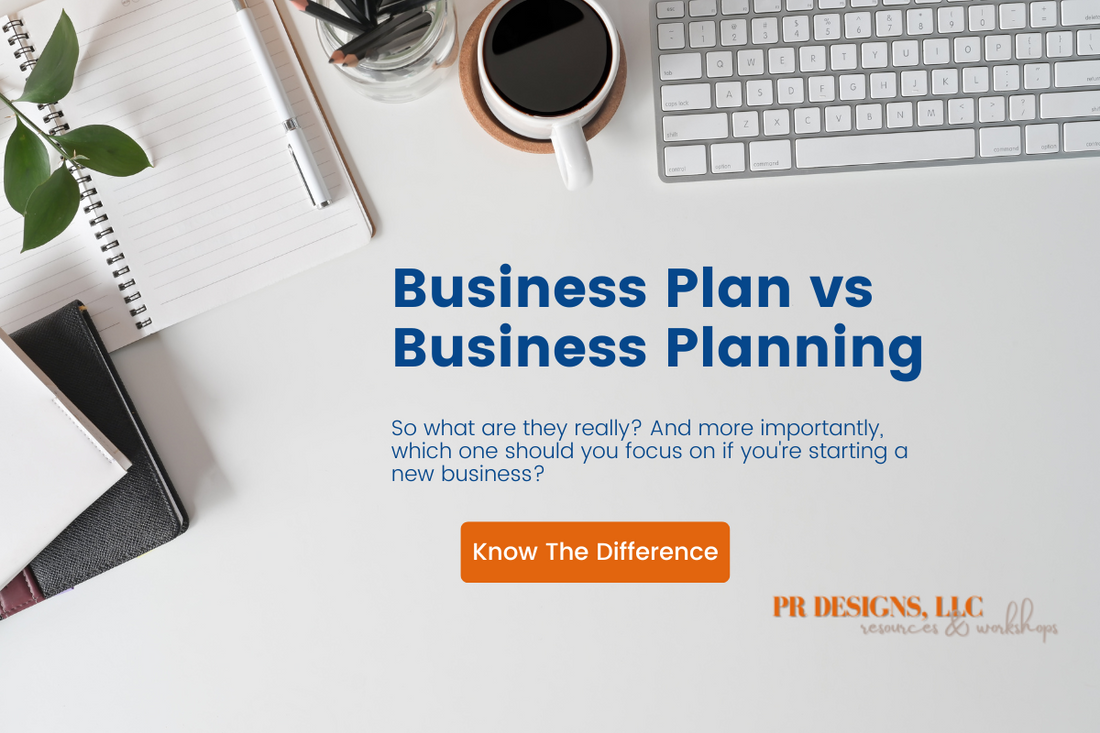
Business Plan vs Business Planning
Share
When it comes to planning, there's a lot of confusion around the terms "business plan" and "business planning." So what are they really? And more importantly, which one should you focus on if you're starting a new business?
What is a Business Plan?
Business Plans are blueprints for a business.
Business plans are more than just a document. They are the blueprint for your future business, and they help you to structure your organization, set goals and plan for the future. If you’re looking for a better sense of direction for your company, a business plan will provide it. Business plans take into account everything that is important to you as an entrepreneur — what makes you tick? What do you want to accomplish? Where do these aspirations overlap with those of other stakeholders in your life? The answers are all in your business plan!
In short: A business plan isn’t just about writing down numbers; it’s about how those numbers connect to one another in order to deliver results that matter most now and in the long run.
A Business Plan details the future for your business, the plans for growth and profits, the strategy to accomplish the goals, and essays on what it takes to run a business. A Business Plan outlines financing, marketing, operations and personnel.
A business plan is a document that outlines your business. It is like a roadmap for your business. A road map for your business. It outlines the future of your business and covers all aspects of it from financing, marketing, operations and personnel matters to long-term strategy and goals.
Business Planning is constantly seeking new opportunities and evaluating ways to improve.
Business planning is a process that seeks to identify problems and opportunities, and create plans to address them. After the plan has been put in place, you evaluate the results and use that to guide your next steps.
Business planners seek new opportunities for their business through research into their industry's state of development, competitor analysis, market surveys, customer interviews and other methods. They also regularly evaluate their current plans based on these findings to see if they're still relevant or need modifications.
Business Planning is acting as a coach, encouraging your team to perform at their best every day.
Business planning is a process of making decisions and taking actions to achieve your goals. It's a plan, but it's also more than that.
It’s you as the coach, leader, motivator and teacher of your team encouraging them every day to perform at their best.
Business Planning is always looking for a better way to do things.
Business planning is never-ending. It is a continuous, never-ending process of growth and development. It is also an individualized process that depends on the needs and goals of you, your business, and your industry. The best way to understand business planning is to think of it as a tool that helps you achieve your objectives.
The goal of business planning is to help you:
-
Clarify what you want out of life (and work)
-
Understand where you are now in relation to where you want to be
-
Figure out a path forward
Business Planning is continuing education in how to be more productive and efficient.
Continuing education has a bad rap. The word "continuing," which implies that you're still learning and growing, can be intimidating to those who have already reached their professional peak.
But continuing education isn't just for people who want to move up the corporate ladder or start their own businesses. It's also great for people who want to stay in their current job while improving themselves through self-improvement.
When you take the time to learn more about your industry, it helps you become more productive and efficient at work because you will have more knowledge at your fingertips when making decisions regarding management of your projects.
Business Planning is following up with customers.
Business Planning is following up with customers to make sure they are happy and to ask for feedback, referrals, and testimonials. By asking for this information you will gain insight into how your product or service can be improved. You can also use the information you collect from these interactions as marketing materials by including testimonials in your website copy and/or having customers refer others when giving advice about your business (e.g., "My friend's husband uses [your company]!").
Business Planning is always tweaking your products or services to suit your customers' needs.
Business Planning is always tweaking your products or services to suit your customers' needs. In fact, listening to customers and understanding their needs is key to a successful business.
This can be achieved by the following:
-
holding regular meetings with clients, suppliers and staff
-
using social media platforms like Facebook and Twitter to get feedback from consumers
Business Plans may be static documents that are reviewed annually or when seeking financing, but business planning isn't static at all. It's a process that never stops!
Business plans may be static documents that are reviewed annually or when seeking financing, but business planning isn't static at all. It's a process that never stops!
Business plans should be reviewed annually, which means they're an effective tool for evaluating your company's financial performance and making sure you're on track to meet the goals you set for yourself. They also help you determine whether any changes need to be made in order for your business plan to succeed. This is particularly important if you’re seeking new funding from a bank or venture capitalist—they'll want to know how well your business plan has worked so far, and what kind of changes have been made since its initial creation.
Business Planning is creating the right atmosphere so that your employees love coming to work every day.
Business Planning is creating the right atmosphere so that your employees love coming to work every day. It's about being proactive, not reactive, and being able to anticipate issues before they occur.
In order for a business plan to be successful in attracting and retaining good employees, it must have four components:
-
A strong leadership team with a clear vision for the organization's goals and how they’ll be achieved
-
An employee-friendly environment that promotes employee retention through competitive pay packages and benefits (such as health insurance), including incentives or additional perks such as flexible schedules or telecommuting options so that workers feel valued regardless of their position within the company hierarchy
Just as you shouldn't drive without a map, you shouldn't start or run a business without a plan (but don't forget that you have to follow the plan).
As you can see, business planning is not just for new businesses or companies with high growth potential. It applies to every business at any stage of its lifecycle. Business plans are an essential part of running and growing your company, whether you're just starting out or have been in operation for 20 years.
You should constantly be planning for the future—it's a continuous process that helps you stay informed about what changes may affect your industry, where your competitors are headed, how technology could impact your business model, and other things that could disrupt your ability to meet customer needs or succeed as an organization. Planning helps you anticipate these challenges before they arise so that when they do happen (and they will), you'll be prepared with a strategy ready to go into action right away.
Don't forget that your plan will be a living document, so make sure that you keep it updated at all times. The best way to do this is by keeping an eye on your business's performance, both in terms of profits and growth. You may also want to seek advice from experts who can help you identify areas where improvements could be made or new opportunities discovered.
